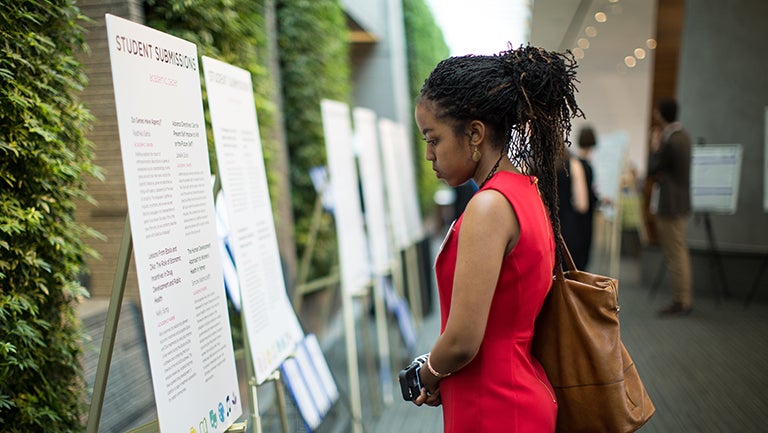Title: Bioethics Showcase Features New Play, Undergraduate Scholarship
A play about a white woman who contemplates donating a liver to a black woman with whom she has a common, slave-owning ancestor, was part of the third-annual Undergraduate Bioethics Research Showcase last week.

A play about a white woman who contemplates donating a liver to a black woman with whom she has a common, slave-owning ancestor, was part of the third-annual Undergraduate Bioethics Research Showcase last week.
Hosted by Georgetown’s Kennedy Institute of Ethics(KIE), the showcase is a juried exhibition of student work focused on ethical issues in health, the environment and emerging technologies.
This year, in addition to showcasing such work, a group of Georgetown students, alumni and local actors performed a stage reading of “A Pound of Flesh,” a new play written by Katie Watson and directed by Anita Maynard-Losh of D.C.’s Arena Stage.
Ongoing Conversation
“The play uses livingliver donation as a framework to explore the issues of what we owe to one another and whether reparative justice is possible,” says showcase founder Laura Bishop, associate teaching professor and academic program manager at KIE.
It also mirrors the conversation at Georgetown on the university’s historic relationship with the institution ofslavery.
Watson is an award-winning teacher of bioethics, law, and medical humanities at Northwestern University’s Feinberg School of Medicine and teaches creative writing and improv at Chicago’s Second City.
She flew in from Chicago for the performance and remained for a panel discussion and Q&A with the audience. Watson was joined by Robert Veatch, a Georgetown professor emeritus of medical ethics and prominent scholar on ethics and policy issues surrounding organ donation and transplantation at KIE, and Samantha Harnack, living donor transplant coordinator at MedStar Georgetown Transplant Institute.
“From its inception, the Bioethics Showcase has included an arts event,” Bishop says. “We’ve found that when we use the lens of the arts to approach a complex, real-world problem, we walk away with a more complete understanding of the thorniness of the problem, its profound impact on the people involvedand its import for all of us in terms of policy resolutions.”
Interdisciplinary Bioethics
As in prior years, students from nearly 20 different majors submitted work to the showcase.
“Bioethics is an inherently interdisciplinary field,” Bishop explains. “The showcase invites student work from a variety of disciplines and in a variety of media, from the analytical to the artistic.”
With topics ranging from environmental degradation to public health emergencies to the ongoing refugee crisis in Europe, this year’s student work reflects not just the interdisciplinary nature of the work but also the urgency of many topics in bioethics.
Grand Champion
The Showcase’s “Grand Champion,” Emily Chin (NHS ’19), was honored for her photo essay on accessibility at Georgetown.
“The essay was inspired by the experiences of several mobility-impaired Georgetown students,” Chin explains, “and is intended to illuminate the lack of fit between their bodies and the environment of Georgetown’s campus.”
“The student work is just superb,” Bishop says. “Every year I am amazed at the thoughtful and sophisticated work our students create, and this year’s judges were similarly impressed.”
Personal Stories
For many students, the submissions were also personal, tracing individual journeys from ignorance to critical awareness and reflection.
“The bioethics course I took as part of the Georgetown Disability Studies Initiative flipped many of my existing paradigms regarding ability and disability on their heads and severely challenged prejudices that I did not even know I held,” explains Aamir Javaid (C’17), whose short video submission took home second prize in the multimedia category.
Lauren Gilmore’s (NHS ’17) poem for the showcase was inspired by her experiences working as a mental health technician at a local psychiatric hospital, while Bridget Festa’s (C’18) personal essay explored ethical and scientific aspects of in-vitro fertilization from her unique perspective as an “IVF baby.”
Social Projects
Also notable were the variety of submissions aimed at the common good.
“Georgetown students usually aren’t content to just analyze a problem,” says Arjun Dhillon, assistant professor of the practice, who served as a faculty mentor for two different student groups submitting to this year’s event. “They want to change things.”
Jamie Farrell (C ’19), Carter Cortazzi (C’19) and Lola Bushnell (C’18), for example, created a business plan for a specialized laundry bag designed to reduce microplastic pollution.
Winners were selected by an interdisciplinary panel of faculty judges and spoke about their work at an awards ceremony on April 5.